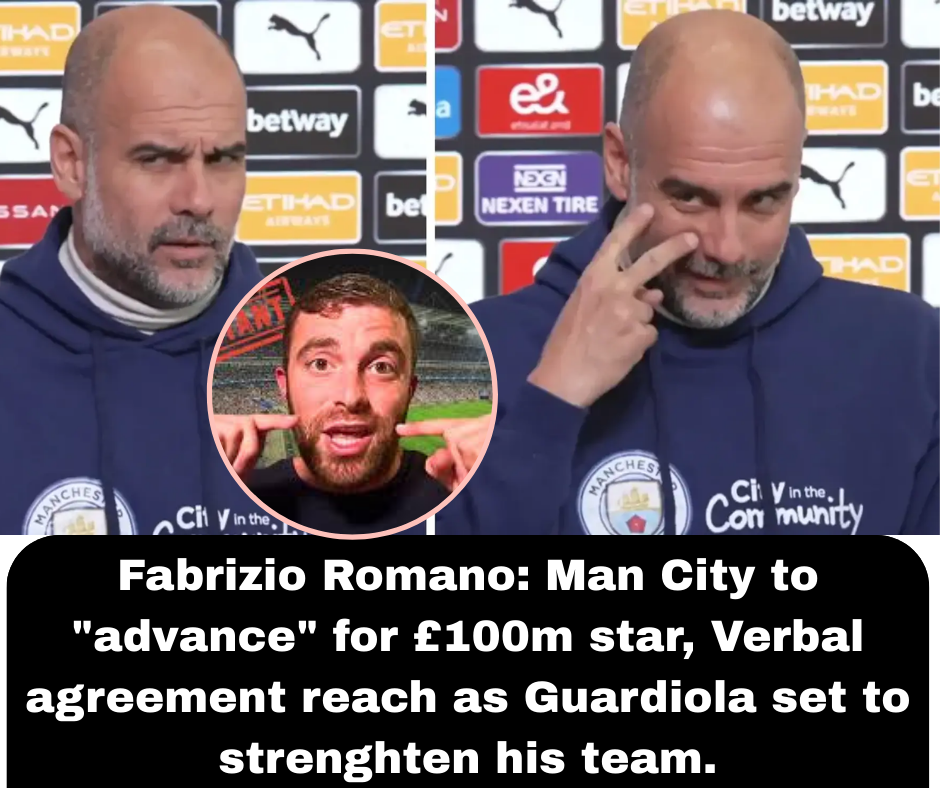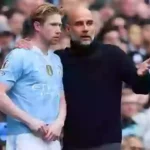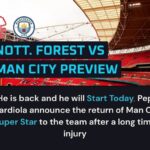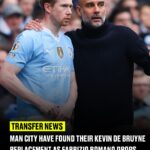Fabrizio Romano: Man City to “advance” for £100m star with top Midfielder

As Manchester City prepare for life without their talismanic midfielder Kevin De Bruyne, the Premier League giants have turned their attention to one of English football’s rising stars. According to reliable transfer specialist Fabrizio Romano, Nottingham Forest’s Morgan Gibbs-White has emerged as a “priority target” for the Cityzens as they look to fill the creative void that will be left by the departing Belgian maestro.
De Bruyne, widely considered one of Manchester City’s greatest ever players, is set to leave the Etihad Stadium as a free agent this summer after a glittering career that has redefined excellence in the Premier League. The 33-year-old’s decision to seek a new challenge marks the end of an era for City, but in typical fashion, the club’s hierarchy are already planning ahead with characteristic ruthlessness and ambition.
Gibbs-White, who has flourished at Nottingham Forest since his £42.5 million move from Wolverhampton Wanderers in August 2022, represents a fascinating choice as De Bruyne’s potential successor. The 25-year-old England international has been instrumental in Forest’s remarkable transformation from relegation candidates to European contenders, establishing himself as one of the Premier League’s most effective attacking midfielders outside the traditional “Big Six” clubs.
Romano’s recent statement confirms that Manchester City “plan to advance on Morgan Gibbs-White deal in the next weeks,” signaling a serious intent to bring the playmaker to the Etihad. While personal terms are not expected to be an issue, the transfer specialist notes that there remains “work to do with Nottingham Forest as they still hope to keep MGW.”
The £100 Million Valuation: Justified or Excessive?
Forest’s reported £100 million (€117.5m, $132.7m) valuation of Gibbs-White has raised eyebrows across the football world. Such a figure would make him one of the most expensive British players of all time and would equal Manchester City’s club-record transfer fee paid for Jack Grealish in 2021.
For a club like Nottingham Forest, whose remarkable rise under owner Evangelos Marinakis has captivated football fans, such a valuation serves multiple purposes. It reflects Gibbs-White’s importance to their project, acts as a deterrent to potential suitors, and ensures that if a sale does materialize, it will provide the financial resources needed to reinvest in the squad.
Gibbs-White’s contract situation adds another dimension to the negotiations. With just over two years remaining on his current deal, Forest find themselves at something of a crossroads. While they maintain hope of retaining their star player, particularly if their push for European qualification is successful, the reality of modern football economics suggests that a substantial offer might prove too tempting to reject.
From City’s perspective, the £100 million asking price presents a significant decision point. The club has demonstrated willingness to spend heavily on talent they believe fits their system, as evidenced by the Grealish transfer, but recent trends suggest a more measured approach to their transfer business under Pep Guardiola and Director of Football Txiki Begiristain.
Statistical Analysis: What Gibbs-White Brings to the Table
This season has seen Gibbs-White elevate his game to new heights, with the midfielder recording five goals and nine assists in 30 Premier League appearances. These raw numbers, while impressive, only tell part of the story of his influence at the City Ground.
A deeper dive into his statistical profile reveals why Manchester City’s recruitment team have identified him as a potential successor to De Bruyne. Gibbs-White ranks among the Premier League’s most creative players in terms of chances created from open play, progressive passes, and successful dribbles leading to shooting opportunities.
What makes these numbers particularly remarkable is the context in which they’ve been achieved. Nottingham Forest have registered the joint-lowest possession statistics in the Premier League this season, sharing a 39.8 percent average with already-relegated Ipswich Town. Gibbs-White has therefore been producing elite-level creativity while operating in a team that sees significantly less of the ball than he would at Manchester City.
His ability to influence games in transition and exploit small pockets of space aligns with the modern Premier League midfielder archetype – technically proficient, tactically adaptable, and physically robust. At 25, he represents an ideal age profile for City’s recruitment strategy: experienced enough to make an immediate impact but young enough to continue developing under Guardiola’s tutelage.
The Tactical Fit: From Counter-Attack to Possession Dominance
The most significant question surrounding Gibbs-White’s potential move to Manchester City concerns his tactical adaptability. At Forest, he has thrived in Nuno Espirito Santo’s system, which emphasizes rapid transitions and direct attacking play when winning possession. City, conversely, employ one of the most possession-dominant approaches in European football, often controlling 65-70 percent of the ball against Premier League opposition.
This stylistic contrast has prompted comparisons to Jack Grealish’s initial struggles after moving from Aston Villa to Manchester City. Grealish, like Gibbs-White, had excelled in a more counter-attacking set-up before joining City, where he initially found it challenging to adapt to Guardiola’s complex positional play model.
Former Manchester City midfielder Michael Brown notes the potential adjustment period: “When you go from being the main creator in a counter-attacking team to fitting into Pep’s system, it’s like learning a new language tactically. Everything from your body positioning to your decision-making has to change. Gibbs-White has the technical ability, but the adaptation period could be significant.”
However, there are reasons to believe Gibbs-White might navigate this transition more smoothly than some predecessors. His football education at Wolverhampton Wanderers under Nuno Espirito Santo exposed him to elements of positional play, while his technical security in tight spaces suggests an aptitude for the intricate combination play that characterizes City’s approach.
Furthermore, Guardiola has shown increasing tactical flexibility in recent seasons, adapting his system to accommodate the specific strengths of key players. The evolution of City’s play since the departure of traditional strikers like Sergio Agüero indicates a coach willing to reimagine his approach based on available personnel.
Forest’s European Dream: The X-Factor in Negotiations
Nottingham Forest’s stunning rise up the Premier League table this season has transformed the narrative around Gibbs-White’s future. Currently sitting sixth in the standings, Forest find themselves in genuine contention for European qualification – an extraordinary achievement for a club that was competing in the Championship just two seasons ago.
The prospect of European football at the City Ground for the first time since the late 1990s represents a compelling reason for Gibbs-White to potentially remain with Forest for at least another season. Having established himself as the team’s creative fulcrum and a fan favorite, the opportunity to lead Forest into continental competition would write his name into the club’s storied history.
Forest manager Nuno Espirito Santo has made no secret of his desire to build the team around Gibbs-White, stating in a recent press conference: “Morgan represents everything we want this club to be – ambitious, technically excellent, and willing to fight for every ball. He is central to our project, and we have no intention of letting him go easily.”
Owner Evangelos Marinakis has demonstrated both ambition and financial commitment since taking control of the club, investing heavily in both playing staff and infrastructure. This financial stability means Forest are not under immediate pressure to sell their prized asset, unlike in previous eras when economic realities might have forced their hand.
However, the allure of joining the Premier League champions and working under Pep Guardiola presents a different kind of opportunity for Gibbs-White. The chance to compete for the biggest trophies in club football and potentially establish himself in the England national team set-up would be difficult to reject if City formalize their interest with a substantial bid.
The De Bruyne Legacy: Impossible Shoes to Fill?
Any player tasked with replacing Kevin De Bruyne at Manchester City faces an unenviable challenge. The Belgian’s legacy at the Etihad Stadium is secure, with many regarding him as the club’s greatest ever player alongside the likes of Colin Bell, David Silva, and Sergio Agüero.
Since joining from Wolfsburg in 2015, De Bruyne has been the creative heartbeat of City’s most successful era, contributing over 100 goals and 150 assists across all competitions. His vision, passing range, and ability to deliver in the biggest moments have defined an epoch of domestic dominance for the blue half of Manchester.
Guardiola himself has frequently described De Bruyne as “irreplaceable,” acknowledging that finding a like-for-like successor is virtually impossible. The manager’s approach, therefore, is likely to involve redistributing creative responsibilities rather than expecting any single player to replicate De Bruyne’s output.
This context could work in Gibbs-White’s favor should he make the move to City. Rather than being burdened with the expectation of being “the next De Bruyne,” he would likely be incorporated as part of a midfield evolution alongside established stars like Rodri, Phil Foden, and Bernardo Silva.
Former City defender Micah Richards believes this approach makes sense: “What made Kevin special wasn’t just his technical ability, it was his mentality and experience. You can’t expect anyone to step in and be that player immediately. If City sign Gibbs-White, it would be about his potential to grow into a key role, not about replacing Kevin like-for-like from day one.”
Financial Fair Play Considerations: City’s Calculated Approach
Manchester City’s transfer strategy must be viewed through the lens of their ongoing situation regarding Financial Fair Play (FFP) regulations. The club continues to contest 115 alleged breaches of Premier League financial rules, with a hearing scheduled for later this year that could have significant implications for their future operations.
This backdrop means that while City retain substantial financial resources, their spending is likely to be more strategic than in previous windows. The £100 million reportedly demanded by Forest would represent a major investment and would likely necessitate player sales to maintain compliance with financial regulations.
City’s wage structure presents another consideration. De Bruyne’s departure will free up significant salary capacity, but Gibbs-White would expect a substantial increase on his current Forest wages if he moves to the Etihad. Balancing these financial elements while maintaining harmony within the existing squad requires delicate management from City’s hierarchy.
Industry analyst Stefan Hammond comments: “City’s approach to transfers has evolved in recent years toward identifying specific targets who fit their technical profile and age model. They’re willing to pay premium fees, but only for players they believe represent good long-term value. The question with Gibbs-White will be whether they view £100 million as justified given his potential development curve.”
England Aspirations: International Stage Beckons
For Gibbs-White personally, the potential move to Manchester City arrives at a crucial juncture in his international career. Despite his impressive club form, he has managed just three appearances for England, finding himself competing for selection in an area of the pitch where the Three Lions boast exceptional depth.
A transfer to City, with the associated exposure of Champions League football and title challenges, could significantly enhance his prospects of becoming a regular in the England setup. The precedent exists in players like John Stones and Kyle Walker, whose international standing benefited substantially from their development under Guardiola.
England manager Lee Carsley has spoken positively about Gibbs-White’s development but has emphasized the need for consistency at the highest level to secure a regular place in the squad. “Morgan has shown tremendous growth over the past couple of seasons,” Carsley noted after England’s recent friendly against Poland. “He’s developing into a complete midfield player, and if he continues on this trajectory, he’ll be pushing hard for more involvement in our upcoming campaigns.”
With Euro 2028 on the horizon, the next three years represent a critical window for Gibbs-White to establish himself as an international regular. Whether that journey unfolds at the City Ground or the Etihad Stadium could prove definitive in determining his ultimate ceiling as a player.
The Potential Domino Effect: Transfer Market Implications
Major transfers rarely occur in isolation, and a £100 million move for Gibbs-White would likely trigger a series of consequential deals across the Premier League and beyond. For Nottingham Forest, reinvesting such a significant fee would be essential to maintaining their upward trajectory.
Reports suggest Forest have already identified several potential replacements, including Juventus midfielder Weston McKennie and Benfica’s João Neves, though the latter would command a substantial fee in his own right. The club’s recruitment team, led by sporting director Ross Wilson, has earned plaudits for their strategic approach to the transfer market, and the Gibbs-White situation will represent their biggest test to date.
From City’s perspective, a successful move for Gibbs-White might signal the end of the road for certain existing squad members. Julian Alvarez has been linked with a move away from the Etihad, while question marks remain over the long-term future of Matheus Nunes, who has struggled to establish himself since joining from Wolverhampton Wanderers.
The wider market impact could extend to other Premier League clubs with interest in Gibbs-White. Manchester United have reportedly identified him as one of five potential replacements for Bruno Fernandes, whose future remains uncertain amid interest from Real Madrid. Similarly, Liverpool are said to have been monitoring Gibbs-White’s situation as they consider midfield reinforcements under new manager Arne Slot.
Historical Context: Forest’s Reluctant Seller Tradition
Nottingham Forest’s storied history includes numerous examples of standout talents departing the City Ground for bigger stages. From Trevor Francis and John Robertson in earlier eras to more recent departures like Stuart Pearce and Roy Keane, the club has often seen its brightest stars move on to new challenges.
The modern iteration of Forest, however, operates with different ambitions and financial realities. Under Marinakis’s ownership, the club has positioned itself as a destination rather than a stepping stone, evidenced by significant investments in both transfers and infrastructure development.
Forest legend and European Cup winner Garry Birtles believes this changing dynamic could influence how the club approaches the Gibbs-White situation: “In my day, when a big club came calling, the financial reality meant players would inevitably move on. What’s different now is that Forest have the resources to compete. They don’t need to sell unless the deal makes complete sense for the future of the club.”
This sentiment is echoed by current manager Nuno Espirito Santo, who has emphasized the importance of retaining key players to build continuity: “Building something special requires keeping your best talents. Morgan understands our project and what we are trying to achieve. Yes, there will always be interest in top players, but we have created an environment where they can fulfill their ambitions right here.”
What Next? Timeline and Potential Outcomes
As the football world awaits further developments in this high-profile transfer saga, several potential outcomes remain on the table. Romano’s reporting suggests that City will advance their interest in the coming weeks, likely initiating formal discussions once the current Premier League season concludes in mid-May.
The most straightforward resolution would involve City meeting Forest’s valuation, with personal terms quickly agreed and Gibbs-White heading to Manchester as De Bruyne’s heir apparent. However, transfer negotiations of this magnitude rarely proceed without complications.
A protracted negotiation seems more probable, with City potentially testing Forest’s resolve with a series of incrementally increasing bids. Alternative scenarios could include a slightly reduced fee with performance-based add-ons, or even a deal that allows Gibbs-White to remain at Forest for an additional season before joining City in 2026.
The player’s own preference will naturally factor significantly into proceedings. While Gibbs-White has consistently expressed his happiness at Forest and gratitude for the platform they have provided, the opportunity to work under Guardiola and compete for the game’s biggest prizes would test any player’s loyalty.
For Forest supporters, the coming months will be filled with both anxiety and pride – anxiety over potentially losing their most influential player, but pride that their club has nurtured a talent deemed worthy of one of European football’s powerhouses. This bittersweet sentiment was captured by Forest Supporters’ Trust chair Andy Caddell: “Morgan has given us moments we’ll never forget, and whatever happens, he’ll always be appreciated for his role in returning Forest to where we belong. If he does move on, we just hope it’s for a fee that reflects his true value to this football club.”
Conclusion: A Career-Defining Crossroads
As Manchester City and Nottingham Forest potentially prepare for what could be one of the summer’s most significant transfer negotiations, Morgan Gibbs-White finds himself at a career-defining crossroads. The decision facing him embodies the eternal football dilemma: remain as the centerpiece of an exciting project or take the leap to one of Europe’s elite clubs.
For City, securing Gibbs-White would represent a statement of intent as they begin planning for the post-De Bruyne era. Despite the Belgian’s imminent departure, the club’s ambitions remain unchanged – domestic and European dominance through a blend of established stars and emerging talents.
Forest, meanwhile, stand at a pivotal moment in their remarkable resurgence. Retaining Gibbs-White would signal their status as a club with genuine European aspirations; selling him for a record fee would provide the financial firepower to potentially strengthen multiple positions across the squad.
Whatever the outcome, Gibbs-White’s situation exemplifies the fascinating dynamics of modern football’s transfer ecosystem, where sporting ambition, financial reality, and personal aspiration converge to shape the futures of players and clubs alike. As the summer transfer window approaches, all eyes will be on whether Manchester City’s pursuit culminates in making the Nottingham Forest star their next headline acquisition.















